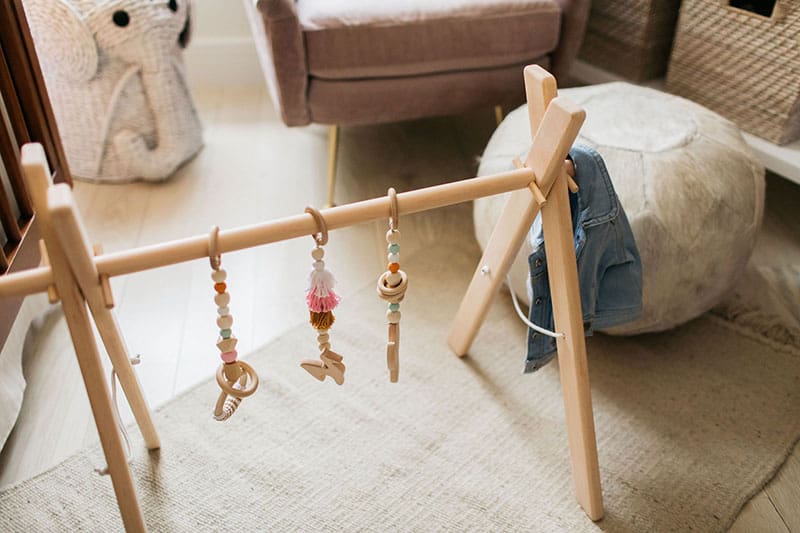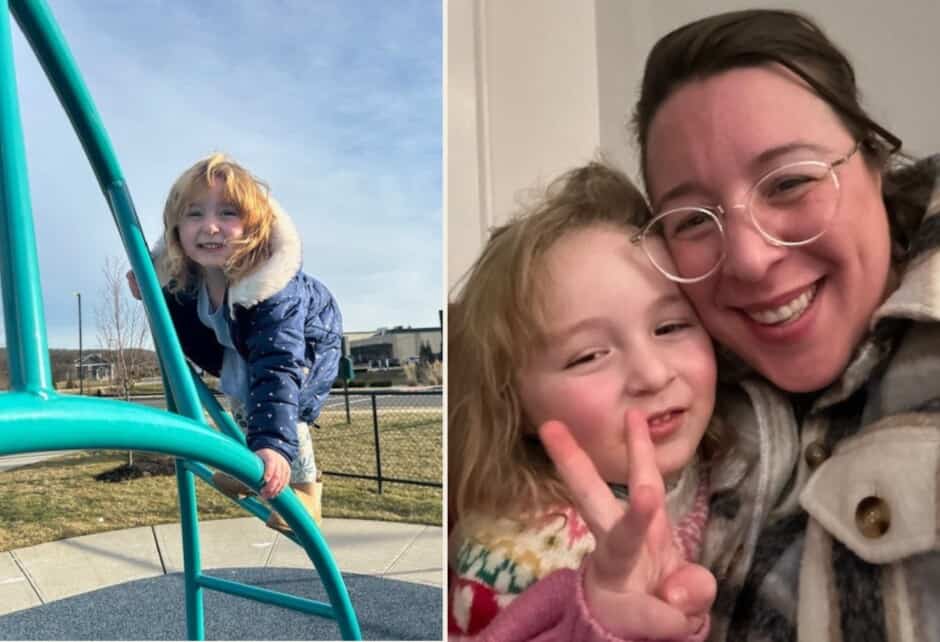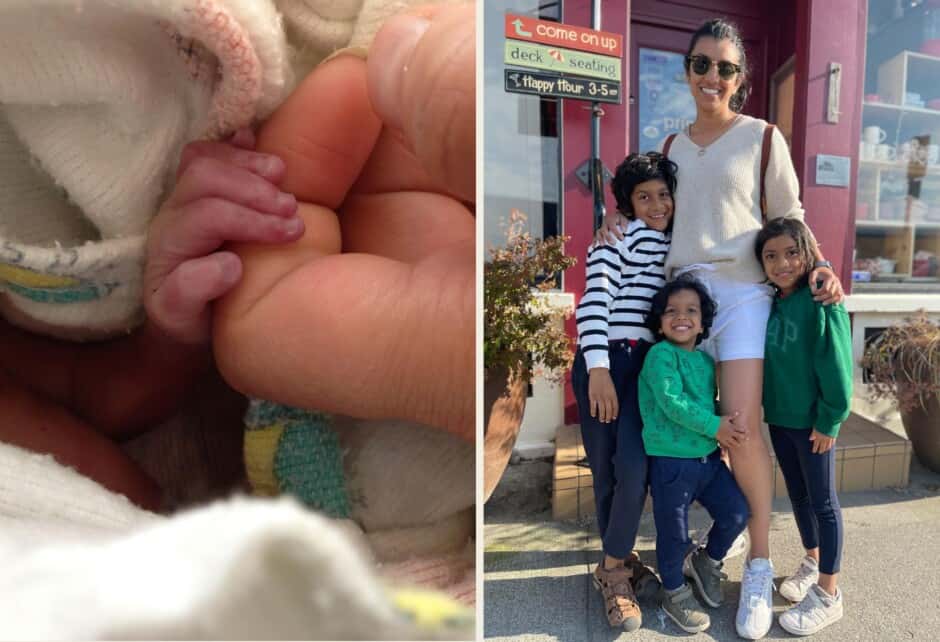
Mom Talk: I Lost My Daughter to SIDS
Written by Megan Hillukka
Photography by Julia Hirsch
The death of a child is completely and utterly earth shattering, and today’s Mom Talk contributor knows this all too well. In 2016, Megan Hilluka lost her 15-month-old daughter Aria to SIDS. She bravely and generously shares her story, along with the invaluable discovery that she was suffering from PTSD in the aftermath of her loss. A mother to five, Megan walks us through her earliest moments of healing and her evolving experience with grief in the hopes that she can help another parent who may unknowingly be battling PTSD. She writes further on the topic of child loss and offers resources on her website—we encourage anyone who wants to know more to check it out.
I had imagined what it would be like to lose a child. I imagined I would curl up in a ball and stay in my bed and die right along with them. I had imagined this, and then it happened. On May 27, 2016, I found my 15-month-old daughter Aria after she had passed away in the night. There was no way I could have imagined the reality of losing a child. It is impossible to understand unless you go through it yourself.
I was 23, and due for our fourth child in a month. Instead of becoming a family of six, we were reduced to a family of four. Our family felt tiny, and the huge hole that was missing was there all the time. Our life felt physically easy with just our two boys, but the mental and emotional roller coaster that came with the grief was so foreign and terrifying. I had never felt such deep and crazy emotions before, and nothing could have prepared me for it.
Our daughter Brilynn was born four weeks after Aria died, and I wondered often how I could possibly say goodbye to one daughter and hello to another in such a short period of time? Why was I given another daughter so soon, when I could hardly grieve and take the time to remember Aria?
Over time and through therapy, I learned that I had Post Traumatic Stress Disorder (PTSD). It became evident when I had a difficult time checking on my other children when they were sleeping, often panicking and thinking they had died in their sleep as well. This stress and sky-high anxiety was slowly killing me on the inside. I had no idea that I had PTSD, I just thought I was going crazy, so it was a relief when my therapist mentioned the possibility. At least I had something that I could use to name what was going on with me.
I think of PTSD as an invisible brain injury. It does not only happen to soldiers. It can arise from anything that is traumatic, including sudden death, abuse, car accidents, natural disasters, etc. There are many ways you can get PTSD and I don’t think it’s talked about enough. There are two ways I think of it: The first one is as a computer with files. In normal events, our brain files our experiences as events that have happened and are in the past. It files them away, and we can recall them when we need them. But with a traumatic event, the event does not become filed as in the past, but as an ever-happening event. When you have PTSD, the events you lived through keep happening over and over again, though in reality that event is in the past.
The other way I think of it is as though the pathways connecting your right and left halves of your brain are cut. You cannot think logically because the two sides of your brain cannot communicate. I believe these pathways need to be reconnected and rebuilt, otherwise we stay in fight-or-flight mode and panic, because that’s all our brain knows how to do now.
With Brilynn and my boys, I found it hard to grieve because I was so terrified of losing another child, and making sure everyone else stayed alive. I still do not know how to separate my grief and my PTSD, as they can have similar symptoms, such as anxiety and the feeling of impending doom, like waiting for the next shoe to drop. But my PTSD made me very difficult to live with. I was snappy and would get angry very quickly. I was so stressed every moment, and I could not find any calm in my body, ever. It created stress in our marriage, and stress in our life.
I started a therapy called Eye Movement Desensitization and Reprocessing (EMDR). I went twice a week for many months. I’m so thankful I had the support group of friends that helped me with child care so I could get to these appointments. This was life changing for me. I think of EMDR as rebuilding those pathways I mentioned earlier. Rebuilding and making new pathways that help you realize the traumatic event is not happening again, and to finally file it away in the past.
It has changed my life in a way that I am incredibly thankful for. Living with PTSD is not a way to live. The stress, the anxiety, the panic is so high, it’s impossible to enjoy life. I’m thankful I can finally find peace and calm in my body now. I really credit it to EMDR and working hard to change the way my brain is thinking.
My journey with PTSD is not over—it will probably never be over, even though it is so much less now. Just like my journey with grief will never be over. When you lose a child, it’s forever. Not only do you lose your child, but you lose a part of yourself, and a part of the innocence and naivety of life. You lose the future and the past.
I know it’s hard for someone to understand if they’ve never been through it, but it makes it difficult for grieving mothers when other people tell them to “get over it” or “move on already.” No mother will ever get over the loss of her child. There is a part of you that dies with them. There is this grief that will always be there, and it is up to the grieving mother to build a life around her grief, and others can support her in that way. Not by telling her to get over her child.
It’s been years since my daughter died, and I still have hard days. This does not mean I’m stuck or can’t get over it. It means I’m a grieving mother and I will be for the rest of my life. I had a recent experience where I was talking about Aria and I started crying. The person I was talking with—she was very kind and nice—but she implied that I was stuck, that I needed help, that because I was crying maybe there was something wrong! I fully support therapy, and getting help. I am a huge advocate of it. But crying and missing your child does not mean there is something wrong with you. Talking about them does not mean you are stuck in the past.
When you become a mother, you are a mother for the rest of your life, regardless of if your child lives on or not. I will never stop grieving, and I don’t want to, because my grief reminds me that I’m a grieving mother. It reminds me of Aria, and I don’t ever want to forget her.
This essay was originally published on August 2, 2019.
Are you a mother with something to say? Send us an email to be considered for our “Mom Talk” column.
Share this story



